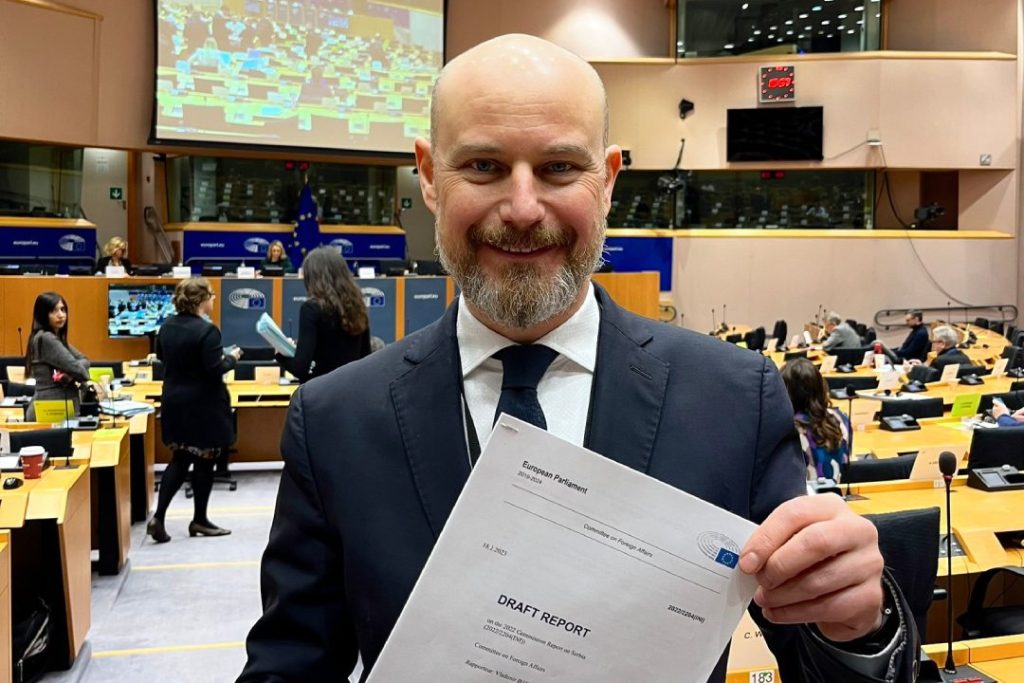Serbia’s membership in the EU can only proceed if Belgrad complies with the European sanctions placed on Russia, according to a report on Serbia from the European Parliament’s Committee on Foreign Affairs.
Serbia’s adherence to the EU’s foreign policy, the continuation of its domestic reforms, particularly in the areas of judicial independence and media freedom, and the continuation of the dialogue with Kosovo are crucial for the country’s accession process, according to Vladimir Bilcik, the rapporteur for Serbia in the European Parliament.
In a tweet, Bilcik declared that his report on Serbia had been approved by a vote of 43 for, 6 against, and 5 abstentions.
My 2022 Report on #Serbia was just adopted by 43 votes in favour, 6 against and 5 abstentions.
— Vladimír Bilčík MEP (@VladoBilcik) April 26, 2023
The plenary debate on #Serbia will take place on 9 May in Strasbourg and the final vote on 10 May.
It has been my honour to serve as the EP’s rapporteur for Serbia during this mandate. pic.twitter.com/6NWDFIkhpD
“The plenary debate on Serbia will take place on May 9 in Strasbourg, and the final vote will be held on May 10,” Bilcik stated.
Serbia is the only nation in the Western Balkans that has not sided with the EU’s policy on Russia’s war of aggression against Ukraine, according to the report. If everything lines up, Serbia’s accession process might make significant progress.
According to broadcaster RTS, the report noted that “Membership negotiations can only proceed if Serbia complies with the sanctions imposed on Russia and advances in reforms related to EU accession.”
The report also urges both parties to negotiate a firm agreement on the normalization of relations based on the “principle of mutual recognition”. It expresses “full support to the dialogue with Pristina and the European mediator Miroslav Lajcak.”
The MEPs criticized “all actions that threaten stability”. They requested the complete fulfillment of previous agreements, including the creation of the Association of Serbian Municipalities.
The report also emphasizes Serbia’s persistently poor adherence to EU foreign policy, noting that while Serbia compiled in 64% of situations in 2021, it did so in only 45% of cases in 2022.
Serbia’s balance between the EU and Russia
Serbia is at the heart of a geopolitical struggle between the West and Russia. Due to Serbia’s refusal to accept sanctions against Russia, the European Union is putting further pressure on Serbia.
Since Russia began a full-scale invasion of Ukraine in February, the EU has made it clear that it expects the Western Balkan nations that aspire to join it to back its international policy, including the sanctions on Russia in response to its assault against a sovereign state in Europe.
According to EU lawmakers, the criminal war launched by Russia against Ukraine makes it more critical than ever for candidates and EU member states to adhere to the terms of the EU’s standards in foreign and security policies.
The situation in Serbia has been precarious since Serbian President Aleksandar Vucic is trying to balance EU efforts to isolate Moscow and Belgrad’s links to Russia, its energy supplies, and diplomatic support for its stance on Kosovo.
By endorsing the UN resolution denouncing the invasion of Ukraine and refusing to recognize Russia’s annexations while also rejecting support for the EU sanctions, Vucic has balanced a fine line between pleasing Moscow and the West simultaneously. But Belgrad has angered the EU leaders by refusing to participate in the sanctions regime.
Russia’s goals in the Balkans
Traditionally, Russia gets more support from the Serbian far-right forces. By backing its Serbian allies, Moscow tries to counterbalance the West’s influence in the Balkans and destabilize the situation in the region. Since the Russian Empire formed political and religious ties with the Balkans, it has been a long-standing goal for Moscow.
Russia positioned itself as a friend of the Orthodox Christian Slavs, particularly in Serbia, as the region was contested between the Catholic Western powers and the Islamic Ottoman Empire.
The main goal of Russia’s strategy is to develop asymmetrical ways to impede the Balkans’ integration into Western institutions while strengthening ties with Serbia. Mainly, Moscow aims to capitalize on regional divisions and escalate hostilities between ethnic and religious groups.
To enhance its influence, Moscow frequently directs its support through proxies and various non-governmental channels, including support for organizations like clubs, sports teams, religious institutions, media outlets, and veteran organizations. Developing this soft power provides the Kremlin with plausible deniability.
By preventing the UN from recognizing Kosovo’s independence, Moscow presents itself as a supporter of the territorial integrity of Serbia. As a result, Russia gets popular with the Serbs. So, the Serbian government is under pressure to keep good ties with Moscow.
Serbia makes a strategic choice
Vucic’s balancing policy ends with the normalization of relations with Kosovo under the EU mediation and further European integration.
For Serbia, joining the EU will be a much better strategic choice than maintaining a solid relationship with Moscow, which has been severely condemned in the international arena and sanctioned for its war in Ukraine, and has become isolated and weaker.
Read also: Dangerous relationship between Serbian far-right and Russia

